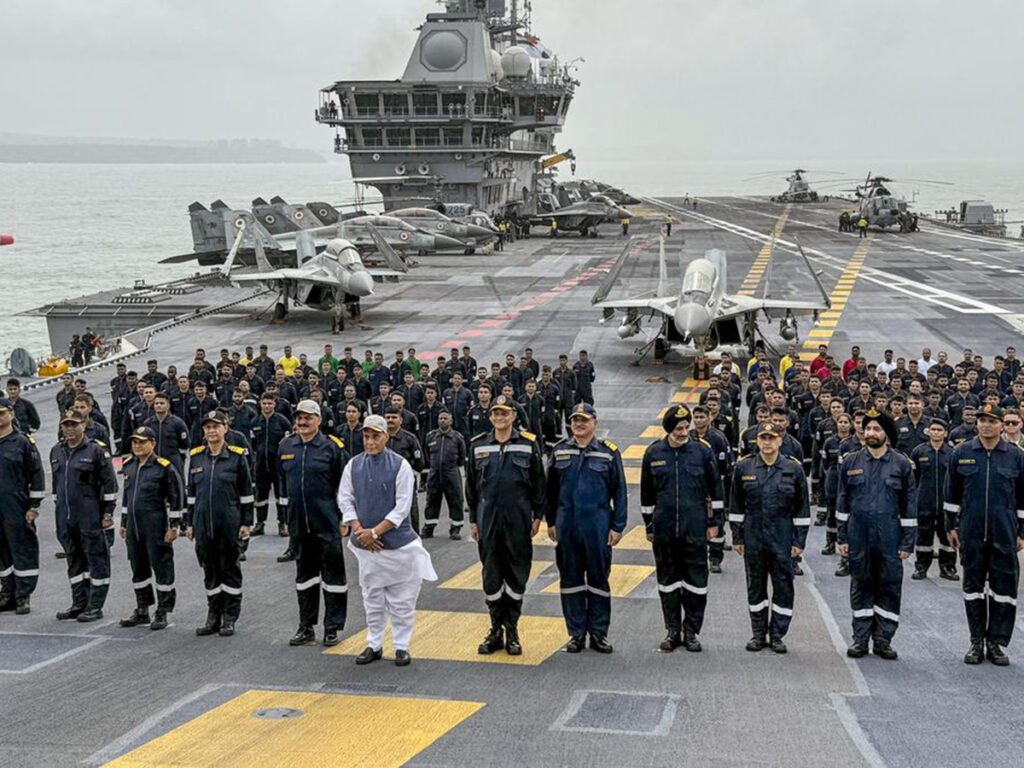Defence Minister Rajnath Singh delivers a powerful message aboard INS Vikrant, emphasizing India’s resolute stance against terrorism following the success of Operation Sindoor.
Goa: On May 30, 2025, Union Defence Minister Rajnath Singh addressed naval personnel aboard the aircraft carrier INS Vikrant, off the coast of Goa, delivering a stern warning to Pakistan. He declared that Operation Sindoor, launched on May 7, 2025, was not merely a military action but a bold statement of India’s unwavering commitment to eradicating terrorism. The operation targeted nine terrorist infrastructure sites in Pakistan and Pakistan-occupied Kashmir (PoK) in response to the April 22 Pahalgam terror attack, which claimed 26 lives, mostly tourists.
A Resounding Message to Pakistan
Singh emphasized that the precision strikes under Operation Sindoor, which killed over 100 terrorists, including key figures involved in past attacks like the IC 814 hijacking and Pulwama blasts, sent shockwaves across Pakistan. “Our strike was so powerful that Pakistan began pleading with the entire world to stop India,” he said, highlighting the operation’s impact. He warned that Pakistan’s long-standing strategy of using terrorism as a tool against India since its independence is no longer viable, urging Islamabad to dismantle terror networks on its soil.
Strategic and Symbolic Triumph
Operation Sindoor, executed in just 23 minutes, showcased India’s military prowess and technological superiority, utilizing indigenous long-range drones and guided munitions. The Indian Air Force successfully jammed Pakistan’s Chinese-supplied air defense systems, ensuring no loss of Indian assets. Singh described the operation as a symbol of India’s political, social, and strategic willpower, stating, “The speed, depth, and clarity with which our armed forces acted were remarkable.” He praised the Indian Navy’s integral role in the operation, underscoring the seamless coordination among the Army, Navy, and Air Force.
Global Reactions and India’s Stance
The operation drew international attention, with countries like the UK and Saudi Arabia urging restraint to prevent escalation. The US, while advocating diplomacy, acknowledged India’s right to respond to terrorism. Prime Minister Narendra Modi, in a May 12 address, reiterated that India would not tolerate “nuclear blackmail” from Pakistan and set new security doctrines: striking terror hubs decisively, rejecting nuclear threats, and treating terrorist leaders and their state sponsors as one. Singh echoed this, calling for international oversight of Pakistan’s nuclear arsenal, citing its economic instability and irresponsible threats.
Pakistan’s Response and Ceasefire
Pakistan retaliated with drone and missile attacks on Indian border areas, targeting civilian and religious sites, which India successfully intercepted using its S-400 defense systems. The tit-for-tat conflict led to 31 deaths in Pakistan and 16 civilian casualties in India due to shelling. On May 10, both nations agreed to a ceasefire, which Singh described as a “pause” contingent on Pakistan’s future actions. “If Pakistan escalates, we will respond with measures they cannot fathom,” he warned, signaling that Operation Sindoor remains ongoing.
A New Doctrine for India
Analysts view Operation Sindoor as a paradigm shift in India’s military strategy, building on the 2016 Uri surgical strikes and 2019 Balakot airstrikes. Unlike previous operations, Sindoor targeted multiple, geographically dispersed sites deep inside Pakistan, including Muridke and Bahawalpur, inflicting significant damage to terror groups like Lashkar-e-Taiba and Jaish-e-Mohammed. Strategic expert Col. Sophia Qureshi noted, “This was a calculated strike to establish deterrence, not coercion, setting a new red line against Pakistan’s proxy war.” The operation also disrupted nearly 20% of Pakistan’s air force infrastructure, according to official sources.
Public and Political Support
The operation garnered widespread domestic support, with an all-party meeting on May 8 unanimously praising the armed forces. Congress leader Mallikarjun Kharge and AIMIM chief Asaduddin Owaisi lauded the strikes, with Owaisi urging global action against terror proxies. A recent survey by the India Security Forum revealed 87% of Indians support such preemptive strikes against terrorism, reflecting public sentiment. Singh paid tribute to fallen soldiers, including BSF Sub-Inspector Mohammad Imtiaz, martyred during the operation, emphasizing the nation’s gratitude for their sacrifice.


